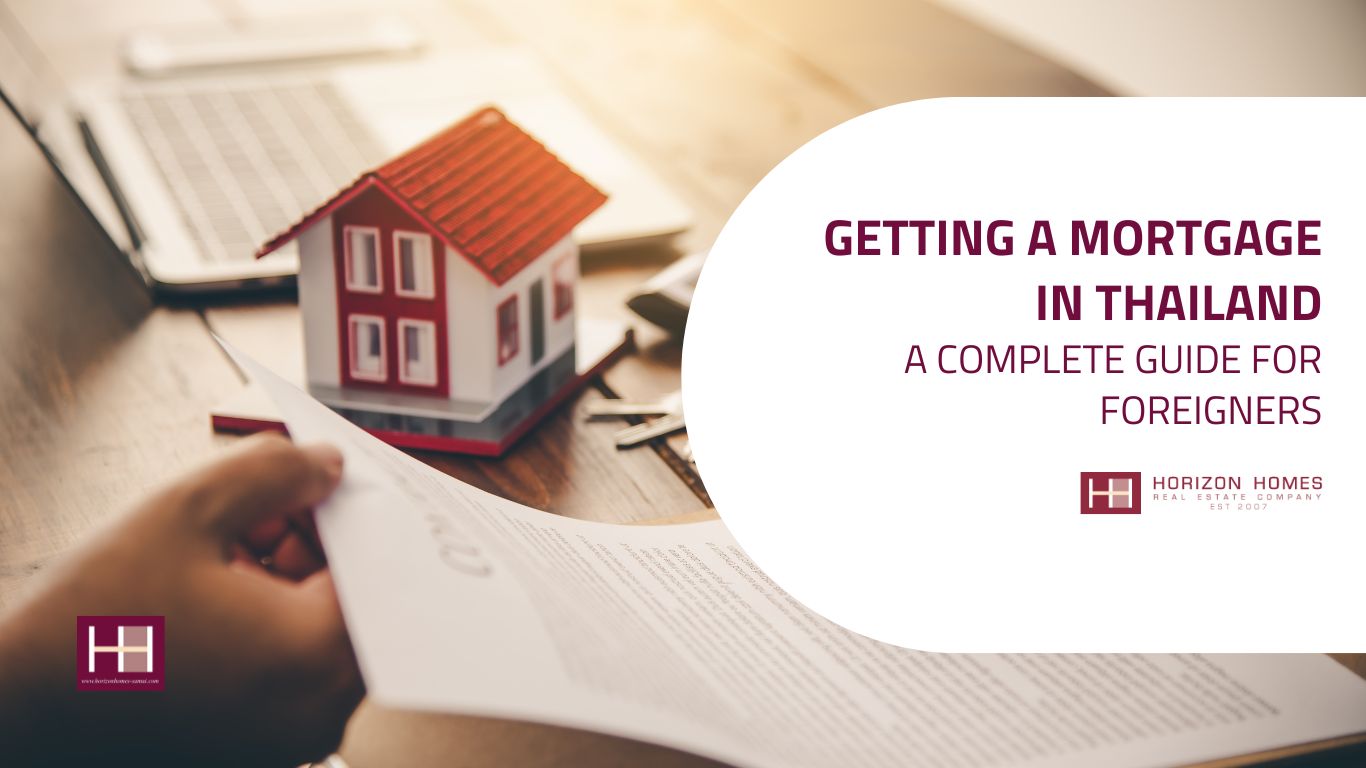Buying property in Thailand can be an attractive opportunity for many foreigners, from retirees looking to settle down to investors aiming to tap into Thailand’s growing real estate market. However, securing a mortgage as a foreigner in Thailand can be challenging due to unique legal restrictions and requirements.
This guide will walk you through the essential aspects of mortgages in Thailand for foreigners, including eligibility, types of loans, documentation, and tips for a successful application.
Can Foreigners Get a Mortgage in Thailand?
Yes, foreigners can obtain mortgages in Thailand, but the options are generally limited compared to those available to Thai citizens. Thailand’s laws restrict land ownership by foreigners, but they can own condominiums outright and secure financing for these properties. Foreigners are often eligible for loans primarily from Thai banks or certain international banks with a presence in Thailand, though the terms may be more restrictive.
Eligibility Requirements for Foreigners Applying for a Mortgage
Thai banks typically have strict eligibility criteria for foreign applicants. Here’s what most lenders will look for:
- Residency Status: Having a work permit and residing in Thailand can improve your chances, although it is possible to apply as a non-resident in some cases.
- Stable Income: Foreigners are generally required to show proof of steady income either through employment or business ownership. Most banks prefer an applicant with a verifiable income source, typically within Thailand.
- Minimum Income Requirements: Depending on the bank, there may be a minimum income threshold, often higher than what Thai citizens are required to show.
- Credit History: A strong credit history is essential. Some banks will check your credit standing in your home country or request additional documentation to assess financial reliability.
- Down Payment: Foreigners are usually required to make a higher down payment, often between 30% to 50% of the property’s value.
Types of Mortgages Available for Foreigners
In Thailand, foreigners have access to a few distinct types of mortgage loans, though they come with limitations.
- Fixed-Rate Mortgages: These offer steady interest rates throughout the loan term, which means predictable monthly payments.
- Adjustable-Rate Mortgages (ARM): These start with lower interest rates that can adjust over time. It’s a riskier option if rates increase, but they can be more affordable initially.
- Developer Financing: Some developers offer direct financing, allowing buyers to make payments directly to the developer. Terms are often more flexible, but interest rates may be higher.
- Home Loans from International Banks: Some international banks with a presence in Thailand, like UOB or ICBC, offer home loans tailored for foreigners.
The Mortgage Application Process for Foreigners
Applying for a mortgage in Thailand requires thorough preparation and documentation. Here’s a step-by-step guide to help you navigate the process:
Step 1: Pre-Approval and Initial Consultations
It’s wise to consult with Thai banks or international lenders early on. Ask about eligibility, required documents, and preliminary approval to understand your borrowing potential.
Step 2: Collect Required Documentation
You’ll need to gather various documents, such as:
- A copy of your passport and visa
- Work permit (if applicable)
- Proof of income (such as salary slips or tax records)
- Bank statements from the last six months
- Evidence of other assets and liabilities
- Financial records (if self-employed)
- Translation into Thai may be required for certain documents.
Step 3: Submit the Application
Once your documents are prepared, submit your application to the lender. Be prepared for additional requests as the bank verifies your eligibility and financial history.
Step 4: Property Appraisal and Loan Approval
The lender will appraise the property to determine its market value and set the loan amount accordingly. Approval may take several weeks and often involves thorough checks on financial and legal fronts.
Step 5: Loan Agreement and Fund Disbursement
Upon approval, you’ll sign a loan agreement outlining the interest rate, repayment terms, and other conditions. Funds are typically disbursed directly to the property seller.
Mortgage Interest Rates and Loan Terms for Foreigners
Interest rates and loan terms in Thailand are generally less favorable for foreigners than for Thai citizens. Here’s what to expect:
- Interest Rates: Rates for foreigners often range from 5% to 8%, depending on the loan type and lender.
- Loan Tenure: Loan periods are usually capped at 15–20 years, with some banks offering up to 25 years for qualified applicants.
- Repayment Terms: Most Thai loans follow an amortized repayment structure, meaning you pay both principal and interest over the loan term.
Interest rates can vary based on the borrower’s profile, loan amount, and property type, so it’s advisable to compare rates from multiple banks.
Tips for Foreigners Applying for a Mortgage in Thailand
- Work with a Local Mortgage Broker: Mortgage brokers familiar with Thailand’s regulations and lenders can help you navigate the process more smoothly and may have access to exclusive offers.
- Open a Thai Bank Account: Having a Thai bank account can simplify the process, particularly for income verification and loan repayment.
- Consider Joint Ownership: If you have a Thai spouse or partner, joint ownership may increase the likelihood of approval.
- Evaluate Currency Exchange Implications: Repayments in Thai Baht mean fluctuations in exchange rates may impact your monthly costs if your income is in a foreign currency.
- Seek Legal Advice: Thailand’s property laws are complex, so consulting a legal expert ensures you’re aware of your rights and obligations throughout the mortgage process.
Conclusion
Securing a mortgage in Thailand as a foreigner can be a complex journey but it’s entirely achievable with the right preparation. Understanding the specific requirements and financial commitments will set you on the right path. Whether you’re eyeing a condominium or exploring the intricacies of Thai property laws, having a solid paperwork foundation and a clear financial plan is crucial.
Securing a mortgage in Thailand as a foreigner can be complex, but the right preparation and local support make it achievable. For comprehensive property listings and expert advice, consider reaching out to Horizon Homes to explore the right property that meets both your lifestyle and financial plans.
Frequently Asked Questions
Yes, foreigners can obtain mortgages in Thailand, particularly for condominium purchases. However, options are limited, and eligibility criteria may be stricter.
Foreigners are generally eligible to finance the purchase of condominiums. Due to legal restrictions, land and houses can be challenging to finance, but some foreigners use leasehold structures for other property types.
Most lenders require foreigners to make a down payment of 30–50% of the property’s value, depending on the property type and the applicant’s financial profile.
Interest rates for foreign applicants usually range from 5% to 8%, varying based on the lender, loan type, and applicant’s profile.
The mortgage approval process can take anywhere from a few weeks to over a month, depending on documentation and the lender’s requirements.
A work permit can enhance your chances of getting approved, but some banks may consider applications from non-residents, especially if they can prove a stable income.




